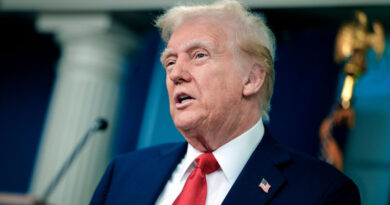Trump Enacts 25% Tariffs on All Steel and Aluminum Imports | US News
Donald Trump has enacted two proclamations that establish a 25% tariff on all steel and aluminum imports into the United States.
A proclamation functions as a type of presidential order for government officials; however, it lacks the legal authority of an executive order.
Nonetheless, the White House has indicated that the tariffs will come into force on March 4.
“This is a significant moment,” Mr. Trump stated in the Oval Office during the announcement of the tariffs. “It’s the start of making America prosperous again.”
He further remarked: “We were being battered by both friends and adversaries.”
Read more
Analysis: Trump’s steel and aluminium tariffs target a deeper issue
Trump issues Gaza ceasefire ultimatum to Hamas
Analysis: The country that could benefit most from Trump tariffs
The proclamations indicate that the president has removed previous exemptions from his 2018 tariffs on steel, resulting in a uniform 25% tax on all imports of the metal.
The newly imposed tariff on aluminum is notably higher than the 10% duty he had during his first term.
These tariffs are part of Mr. Trump’s aggressive initiative to reshape global trade, as he asserts that the increased costs on consumers and companies purchasing foreign goods will ultimately boost domestic manufacturing.
However, external economic analyses indicate that these tariffs could lead to higher costs for factories utilizing steel and aluminum, potentially putting US manufacturers in a worse position.
Canada, which is the largest supplier of steel to the US, condemned the decision.
Candace Laing, CEO of the Canadian Chamber of Commerce, stated that Mr. Trump’s actions are destabilizing the global economy.
“Today’s announcement illustrates that ongoing uncertainty is a permanent fixture,” she commented.
Trump’s tariff battle
Mr. Trump’s proclamations follow shortly after the US imposed a 10% tariff on all goods imported from China.
Consequently, China imposed 10% tariffs on American crude oil, agricultural machinery, large cars, and pickup trucks.
Additionally, there will be 15% tariffs on coal and liquefied natural gas imported from the US.
The US’s intention to impose 25% tariffs on Mexico and Canada was postponed following agreements regarding border security.
In response, Mexico’s president announced the dispatch of 10,000 National Guard troops to the US border immediately as a condition for the tariff delay.
Mr. Trump mentioned that the Mexican troops would be “specifically tasked” with halting the flow of fentanyl into the US, alongside preventing illegal immigration.
Meanwhile, Canada’s Prime Minister Justin Trudeau stated that nearly 10,000 frontline personnel “are and will be engaged in securing the border.”
He further noted that Canada would appoint a “fentanyl czar,” label drug cartels as terrorists, and ensure “24/7 surveillance of the border.”




